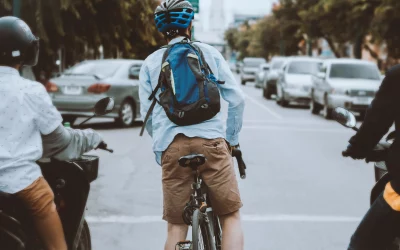Colorado Bike Rental Liability Information
With Colorado Springs consistently listed as a top city in the Southeast to live in, giving an abundance of culture and facilities at affordable costs, one can only assume that the expansion of infrastructure will entice more people to move here. As seen by the high traffic, a startup called mountain Bike Share has given public transit a facelift with an already congested location.
According to their website, riding their rental bikes around the city helps to reduce our carbon footprint and saves you money, among other benefits. This kind of activity encourages a healthy, easygoing lifestyle.
However, signing a contract to utilize one of these rentals entails waiving a slew of rights that many individuals are unaware of. That is not to say that renting one of the bikes will always be a negative mode of transportation or that the expense of a hypothetical mishap is too expensive; in an optimistic scenario, it may wind up being all the firm recommends for a renter.
However, riding one of the bikes implies that you, as the owner of an expensive city-owned bicycle, should understand who is responsible for what and why. Product liability in bike rentals might be complicated by the rental agreements and waivers completed before the transaction.
 AGREEMENTS OF VARIOUS TYPES
AGREEMENTS OF VARIOUS TYPES
Activity releases, such as those used in motorcycle and racing events, have successfully compensated for damages caused by the rider and corporation. They should contain an acceptance of risk clause that riders sign, stating that they are aware of the risks associated with the physical activity they are partaking in.
Product sales releases claiming to absolve the manufacturer of responsibility for a faulty product have had little success due to the loss of risk claim linked with the activity rather than the bike alone.
If there is a bicycling accident, this will not assist since, unless the rider is directly blamed for the accident, the rider, not the product, will be at responsibility. Product defect and failure to warn claims are more difficult to overcome.
Rental releases are a combination of the two since the renter is searching for a particular product to accomplish a certain task or meet a specific demand. This is the optimal release format since it encompasses both the activity and the result.
Much of the defense’s success in a disagreement will be determined by the plaintiff’s stated cause of action. With a strong release, it is simpler to refute claims of negligence against the shop. This is because the firm and individual should have been aware of any dangers involved with the bike or activity based on their signature on the waiver.
The rental scenario is similar to a sale, except that the transaction is continuous for the same bike, which may have been misused or changed inadvertently by previous renters.
Explicit waivers allow for the disclaimer of express and implied warranty claims. As a result, product accountability claims would be more challenging to make. Suppose the manufacturer issued, rather than just the company that provided the rental.
In that case, the defense could be that the rental bicycle was not adequately maintained by the retailer, which would have a more significant impact than if the manufacturer was sued, as retailers are presumed to be familiar with the bicycle’s maintenance requirements.
No release is flawless, and no one release could conceivably cover every conceivable occurrence. Understanding the difference between good and poor waivers might assist tenants in determining what they may be giving up in court. The Bike Share program in Colorado Springs utilizes the third release and tight guidelines for personal agreements to ensure that all bases are covered.
As a tenant, you should carefully study the agreement’s terms and conditions. Many people do not want to read it all due to its dryness, but it is necessary for your safety down the line.
Numerous cities around the United States and throughout the globe have implemented bike-share systems. Of course, Colorado Springs, Colorado has a bike-share program, but they’re popping up all over the place,
They are located across California, including San Francisco, San Jose, Santa Cruz, Los Angeles, etc. Of course, many of these towns also have businesses that lend bicycles to tourists and other visitors.
Bike-sharing is a concept that has exploded in popularity, and for a good reason. As individuals across the globe have discovered, riding a bike-sharing bicycle is a simple, economical, and hassle- free way to travel about a city. Additionally, it is a highly safe mode of transport.
However, as is the case with any means of transportation, accidents do occur. There are several parallels between a bicycle accident on your bicycle and one on a rented or shared bicycle. However, if you’ve been involved in a mishap while riding a rental or bike-sharing bicycle, there are some important distinctions to be aware of.
To appreciate the distinctions between collisions on rental and bike-sharing bicycles and wrecks on your bicycle, let’s first examine the similarities.
WHO WAS CARELESS?
If you are involved in a vehicle crash, you will be negotiating with the driver’s insurance company to recover compensation for your injuries and damages. Negotiations with the driver’s insurance company will always revolve around who was at fault (you or the driver) and to what extent.
The case will be resolved if you and the insurance company agree on carelessness and the number of damages. If you cannot reach an agreement, you will need to establish the driver’s negligence in a court of law to seek compensation for your injuries.
Because a lawsuit is a next step if a settlement cannot be reached, most injury claims are negotiated out of court. However, because of the complexity of the legal and accident forensics concerns, bikers who sustain injuries more than mild ones should always consult an attorney skilled in handling bicycle accident cases before speaking with the driver or the driver’s insurance company.
ATTEND TO THE POLICE
Always wait for the police to arrive at the site of an accident to make an official report. Several hours after an accident, several riders are unaware they have been wounded. Minor injuries may progress to become severe and permanent. By that time, identifying the at-fault motorist may be impossible.
You should avoid engaging in any negotiation with the at-fault motorist. The driver may not provide you with proper information about their name, insurance status, or car ownership.
Many drivers who cause an accident may apologize at the scene and take responsibility for the incident but will subsequently reject their carelessness after considering the repercussions of their actions. They may even deny their presence at the site of the accident!
By waiting for the police, you ensure that an impartial third party is present at the crash site and has the power to demand the driver’s identification, registration, and insurance information.
Similarly, you should never state that you are “fine” to the driver or the police. The fact is that you have no way of knowing whether you are OK since a physician has not assessed you; thus, why would you want to reassure the driver and police that you are “fine”?
What if you have been hurt but are unaware? You do not want the driver’s insurance company to know that you said that you were OK; only a doctor should ever give you a clean bill of health.
If the police create an accident report, verify that the information is correct. The accident report will include the driver’s statement, as well as those of any other witnesses. The responding officer may choose to ticket the motorist, which might be advantageous when negotiating with the insurance company.
The accident report should also contain a statement from the rider; regrettably, law enforcement authorities do not always get a statement from the cyclist before concluding their investigation.
The officer may have already determined that the cyclist is at fault before speaking with them in some circumstances. As a result, ensure that you deliver your statement to the police after the accident, if you can.
Whether or whether an accident report is filed, ensure that you obtain the driver’s name and contact information, as well as the names and contact information of any witnesses. If you are physically unable to gather this information, enlist the assistance of a witness.
The accident site should be studied to ascertain the cause of the event. The investigation should involve:
- Measuring skid marks.
- Photographing the accident area.
- Interviewing more witnesses.
- Measuring and diagramming the accident scene.
Additionally, it would help if you left the rental or bike-sharing bicycle and any other damaged items in their current location. If possible, photograph the bicycle and any damaged components or equipment, or enlist the assistance of someone.
However, even if the incident was not caused by a faulty bicycle, it is critical to record the damaged bicycle to determine how the crash happened. This is especially critical if it is subsequently proven that the incident was caused in part or wholly by a faulty bicycle.
CONSULT A PHYSICIAN IMMEDIATELY FOLLOWING THE CRASH
In a well-known case illustrating the hazards of concealed injuries, rock singer Stiv Bators died after being struck by a cab in Paris. Bators went to the hospital after the crash, but after waiting many hours in vain to see a doctor, he concluded that he was not gravely hurt and returned home. Later that night, he died peacefully in his sleep from an untreated traumatic brain injury.
DO NOT ASSUME ANYTHING ABOUT YOUR INJURIES IN THE MINUTES AND HOURS IMMEDIATELY
AFTER A CRASH. It is very usual for individuals to believe they have not been significantly harmed after an accident, only to discover later the exact depth of their injuries. If you’ve been involved in an accident, you must consult a doctor quickly after the incident.
It would help if you did not make any judgments regarding the nature of your injuries; instead, let the doctor determine whether or not they are significant.
By seeking immediate medical examination and treatment, you increase your chances of catching a major injury in its earliest stages—and, if you are not gravely hurt, you increase your chances of receiving a clean bill of health from a doctor.
Additionally, since you will be dealing with the driver’s insurance company, immediate medical assessment, and treatment for your injuries will show that you were harmed. In contrast, the medical records created by the medical provider will assist in establishing the degree of your injuries.
As soon as possible following your accident, have many photographs taken from various angles and in various lighting conditions. Maintain a notebook (an “injury diary”) of your physical symptoms immediately after the event and update it every few days.
CONSULT AN ATTORNEY BEFORE COMMUNICATING WITH THE INSURANCE COMPANY
Consult an attorney before communicating with the driver’s insurance company. The majority of riders want to be reasonable with their insurance carrier. Regrettably, when you engage with the insurance company, they are accumulating information about you that will be used against you in the future.
The insurance company will interpret what you see as an attempt on your side to provide an accurate and truthful account of the accident as an opportunity to collect information in support of their position that your carelessness caused the accident.
WHO PAYS FOR INSURANCE?
As with mishaps involving your bicycle, one of the challenges that come while riding a rental or bike- sharing bicycle is determining whether insurance coverage protects you in the event of an accident.
While there are many parallels between accidents while riding your bicycle and crashes while riding a rental or bike-sharing bicycle, some significant distinctions are worth noting.
INSURANCE FOR THE DRIVER
In the event of a car-on-bike collision in which the driver is judged to be irresponsible, the driver’s insurance carrier is liable for paying you for your injuries and losses. This is true whether you are riding your bicycle or one rented or shared by others.
YOUR INSURANCE: UNINSURED/UNDERINSURED MOTORIST
However, one issue that bikers may confront in a car-on-bike collision is an “underinsured” motorist. This indicates that the motorist is insured by the law but for a lesser sum than the damages caused by your injuries and losses. We have uninsured drivers on the road because state minimum insurance requirements are sometimes quite low.
For example, in California, the minimum necessary insurance for bodily injury or death is $15,000. This is a very low minimum insurance requirement that may quickly be surpassed in the event of a car-on-bike collision resulting in rider injury.
Even in Colorado, where the minimum necessary insurance for bodily injury is $50,000 per collision, this amount may soon be depleted if a cyclist experiences catastrophic injuries in a crash.
In the circumstances involving an underinsured driver, your own vehicle insurance policy’s UM/UIM (“Uninsured Motorist/Underinsured Motorist”) coverage (which is now available in comprehensive bicycle insurance plans) may kick in if the driver’s insurance policy has expired.
Additionally, you would utilize your own UM/UIM coverage if you are struck by an uninsured motorist or a victim of a hit-and-run driver. As a result of these considerations, bikers who own an insured car should get the largest level of UM/UIM coverage allowed.
However, a word of caution—DO NOT accept payment from the insurance company of an underinsured motorist without first obtaining clearance from your insurance carrier. Accepting a settlement without first obtaining clearance from your insurance company may result in your insurance company declining to pay your UM/UIM claim.
The reason for this is that when you make a UM/UIM claim, you authorize your insurance carrier to “stand in your shoes” and pursue the underinsured motorist. Accepting a settlement offer from the underinsured driver’s insurance company precludes your insurance company from exercising its legal right to file a claim against the underinsured driver.
As a result, if you do not obtain permission to settle, your insurance company may legally refuse to pay your UM/UIM claim.
MEDICAL PAYMENTS COVERAGE OR “MED-PAY”
In Colorado (and 36 other states), your vehicle insurance policy must include “Personal Injury Protection,” sometimes referred to as “Med-Pay.” Suppose you are injured in a car-on-bike incident. In that case, your injury protection (PIP) coverage under your vehicle insurance will cover your injuries for the first year after the collision, up to the limit of your PIP coverage.
Because Colorado is a “hybrid” state with elements of no-fault and tort responsibility, if your PIP coverage is exhausted as a result of your injuries (which is simple to do with a $15,000 minimum policy coverage), you may submit a claim against the irresponsible driver’s insurance policy.
Launching a claim entails talking with the insurance company regarding who was responsible and, if you cannot reach an arrangement with the negligent driver’s insurance company, filing a lawsuit against the negligent driver.
In California (and 12 other states), “PIP” coverage is optional but not compulsory on your motor insurance policy.
There are various advantages to having PIP coverage included in your vehicle insurance policy:
The majority of PIP policies will cover the cost of medical care (this is referred to as the “Med-Pay” element of your PIP policy), missed earnings, and burial expenditures in the event of a fatal incident.
PIP protects you regardless of who caused the crash.
PIP will cover your medical fees considerably more quickly than the driver’s insurance policy would.
PIP benefits are payable regardless of whether your claim against the driver’s insurance carrier is successful or unsuccessful.
PIP will cover you if you are harmed by an uninsured, underinsured, or hit-and-run motorist.
The downsides of PIP coverage include the following: PIP coverage is more costly than other forms of coverage on your insurance. Thus consumers often choose the bare minimum.
In jurisdictions that mandate PIP, the minimum necessary coverage is often relatively low (for example, $15,000 in Colorado). This low minimum implies that your PIP coverage may be depleted within minutes of a major collision.
PIP coverage is likely to be far less than the damages available in a claim against the driver’s insurance company since PIP does not include damages for pain and suffering. For instance, if you are gravely wounded and suffer from pain for the remainder of your life, your PIP policy will not cover this.
INSURANCE COVERAGE: HEALTH INSURANCE
If you have health insurance, it will pay your medical expenses if you are injured in an incident, regardless of whether the motorist has insurance. This will alleviate your immediate concern about medical expenditures while your lawsuit against the driver is being resolved.
However, keep in mind that if your health insurance covers your medical expenses and you subsequently obtain damages for medical expenses from the motorist who damaged you, you will be forced to return your health insurance carrier for the covered medical expenses. As a result, you must exercise caution while negotiating a settlement to ensure that you are rewarded for ALL of your medical expenses.
HOMEOWNER’S OR RENTER’S INSURANCE
If you have homeowner’s or renter’s insurance, you are protected against liability for your negligent activities that result in bodily harm or property damage.
INSURANCE COVERAGE FOR THE BICYCLE COMPANY
But what if there is a collision that is not your fault or the fault of another driver? What if the accident is the result of a faulty product—the bicycle itself? A malfunctioning bicycle, especially one that has been neglected, neglected or previously broken, maybe the cause of an accident. In this instance, the manufacturer of the bicycle, the rental business or bike-sharing company, or both, may be held accountable for your injuries.
YOUR AGREEMENT FOR BICYCLE RENTAL OR BIKE SHARING
However, there is a critical caveat that you should be aware of in this situation. Depending on the contract, your bicycle rental or bicycle sharing agreement may include wording that claims you have renounced all of your legal rights if you are hurt due to the company’s carelessness in supplying you with an unsafe product.
If you do not comply with their terms, additional provisions in the contract will result in your being in violation of your agreement. Therefore, if you are hurt while riding a rental or bike-share bicycle, you must contact an expert bicycle attorney before speaking with the rental or bike-sharing firm about your rights and options.
Because your contract will most likely require you to report the incident and return the bicycle within a defined period, time is important in a bicycle crash involving a rental or bike-sharing bicycle. If you fail to comply with this requirement, you may violate your contract.
Consequently, since you are operating under the terms of a contract, you must be aware of the terms of your deal. Before riding, you should acquaint yourself with the terms of the contract since failure to comply with the terms of the contract may have significant consequences for your legal rights.
Consider the following scenario: If you engage in any of the activities banned by the contract, you may violate the contract and compromise some essential legal rights if you are later hurt. You may also be obliged to do a pre-ride safety check under your contract, and failing to do so may result in you violating your agreement.
This is crucial to understand: You may also be required to discharge the bicycle rental or bike-sharing firm from any responsibility arising from their carelessness under the terms of your rental or bike- share contract.
Bicycle rental or bike-sharing companies should be seen as engaging in “wishful thinking” when it comes to this agreement provision. On the other hand, the contract you signed may say that the corporation is not accountable for its wrongdoing; thus, you must consult with an expert bicycle accident attorney before speaking with the bicycle rental or bike-sharing company about the incident.
Even though you should generally follow your contract’s requirements for accident reporting, if you have been injured while riding a rental or bike-share bicycle and you suspect that your injury was caused by a defective bicycle, or a bicycle that has been poorly maintained, unmaintained, or previously damaged, do not communicate with the bicycle rental or bike-share company about the crash and do not make arrangements to return the rental bicycle or bike-share bicycle before consulting with an attorney.
As a result, since you must comply with the accident reporting requirements of your contract, you must speak with an expert bicycle accident attorney as soon as possible.
Remember that if you have been wounded due to the carelessness of a bicycle business, the bicycle company and its insurance company are not your allies in this situation. Even if they claim that they are not negligent, after you have been wounded and their carelessness is in question, they are not on your side, no matter how kind and compassionate they seem to be initially. At that time, you and your opponent are on the same side.
Additionally, their insurance provider is in the same boat. No matter how vehemently the bicycle business rejects any blame, they are covered by liability insurance, and their insurance company is not on your side of the argument.
The insurance company is not responsible for compensating you for the injuries you have sustained due to the faulty goods. As a result, their primary goal is to reduce the amount of money paid out in faulty product lawsuits, which they do by stonewalling you.
They may deny that the bicycle business is accountable, and they may also seek to transfer the responsibility for the harm to someone else—most often you.
While the majority of cyclists want to be fairly compensated for their injuries and losses and strive to be fair and reasonable with their insurance companies when you speak with the bicycle company or their insurance company, they have a different goal in mind: they are gathering information that will be used against you in the future.
As a result, if you believe that your injuries were caused by a defective or poorly-maintained, unmaintained, or previously damaged bicycle, you should always consult with an experienced bicycle accident attorney first before speaking with the bicycle company or their insurance carrier about the cause of the crash and the injuries you sustained.
The basic reason firms choose arbitration over litigation is that they tend to get far better outcomes in arbitration than in court, where a jury of their peers judges them. In addition, your contract may compel you to resolve any disputes via arbitration.
If your contract gives you the option to opt-out of arbitration and class action lawsuits, you should make use of that option. You should consult with an experienced bicycle attorney if you have been injured due to a defective product or other negligence on the part of the company, even if you have not chosen to opt-out of arbitration.
You must understand your rights and options before agreeing to go through with arbitration.
COLORADO SPRINGS, COLORADO CONTRACT AS AN EXAMPLE BIKESHARE
As a result, if you have been harmed as a result of a faulty product given by a bike rental or bike- sharing firm, you should speak with an expert bicycle attorney who can advise you about your legal rights, regardless of the wording of the contract that you believe you are committing to.
When riding a bicycle rental or bike-sharing bike, you may be liable for injuries sustained in the collision.
Suppose you have been injured in a collision involving a rental bicycle or a bike-sharing bicycle, regardless of the cause of the incident. In that case, you should contact bicyclelaw.com or another personal injury attorney who is familiar with biking for assistance.
While many lawyers are capable of handling general injury claims, you should ensure that your attorney has the expertise and is knowledgeable with the following areas:
WARRIOR CAR ACCIDENT LAWYERS
You or a loved one renting a bike and want to know your rights under the terms of the waivers; please come in for a free consultation and review of the agreements. We accept cash, checks, and credit cards.
If you have been involved in a bike accident and need to submit a claim against the business or manufacturer, contact the bike rental attorneys at Warrior Car Accident Lawyers, now for comprehensive representation. You may contact the company via phone at 719-300-1100.







